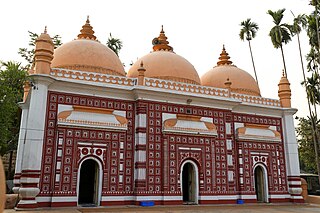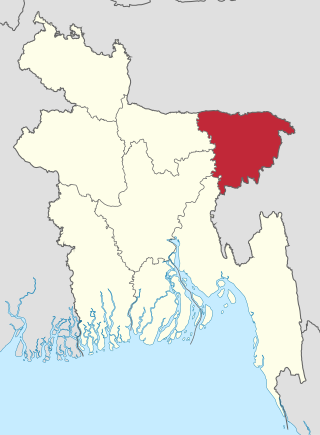
The economy of Bangladesh is a major developing market economy. As the second-largest economy in South Asia, Bangladesh's economy is the 35th largest in the world in nominal terms, and 25th largest by purchasing power parity. Bangladesh is seen by various financial institutions as one of the Next Eleven. It has been transitioning from being a frontier market into an emerging market. Bangladesh is a member of the South Asian Free Trade Area and the World Trade Organization. In fiscal year 2021–2022, Bangladesh registered a GDP growth rate of 7.2% after the global pandemic. Bangladesh is one of the fastest growing economies in the world.

Chittagong, officially Chattogram, is the second-largest city in Bangladesh. Home to the Port of Chittagong, it is the busiest port in Bangladesh and the Bay of Bengal. It is the administrative seat of an eponymous division and district. The city is located on the banks of the Karnaphuli River between the Chittagong Hill Tracts and the Bay of Bengal. The Greater Chittagong Area had a population of more than 5.2 million in 2022. In 2020, the city area had a population of more than 3.9 million. The city is home to many large local businesses and plays an important role in the Bangladeshi economy.

Sylhet Division is the northeastern division of Bangladesh. It is bordered by the Indian states of Meghalaya, Assam and Tripura to the north, east and south respectively, and by the Bangladeshi divisions of Chittagong to the southwest and Dhaka and Mymensingh to the west. Prior to the Partition in 1947, it included Karimganj subdivision. However, Karimganj was inexplicably severed from Sylhet by the Radcliffe Boundary Commission. According to Niharranjan Ray, it was partly due to a plea from a delegation led by Abdul Matlib Mazumdar.

Sylhet is a metropolitan city located in the northeastern region of Bangladesh. It is the administrative center of Sylhet Division. It is situated on the banks of the Surma River. The city has a population of approximately 700,000 people, making it the fifth-largest city in Bangladesh.

Panchagarh is a district of the Rangpur division in Northern Bangladesh. Panchagarh is the northernmost district of Bangladesh. It lies between 26º00' and 26º38' north latitudes and between 88º19' and 88º49' east longitudes. It was established as a district on 1 February 1984.

Sonali Bank PLC is the principal state-owned leading public commercial bank in Bangladesh. It is the largest bank in the country. Ziaul Hasan Siddiqui is the chairman of the Bank. Niranjan Chandra Debnath and Sanchia Binte Ali are the deputy managing directors of the bank.

The Bangladesh Post Office also known by trade name Bangla Post is a government-operated agency responsible for providing postal services in Bangladesh. It is a subsidiary of the Ministry of Posts, Telecommunications and Information Technology. This ministry is concerned with the policymaking for its two attached departments. The Director General of Bangladesh Post Office is Md Harunur Rashid.

Agriculture is the largest employment sector in Bangladesh, making up 14.2 percent of Bangladesh's GDP in 2017 and employing about 42.7 percent of the workforce. The performance of this sector has an overwhelming impact on major macroeconomic objectives like employment generation, poverty alleviation, human resources development, food security, and other economic and social forces. A plurality of Bangladeshis earn their living from agriculture. Due to a number of factors, Bangladesh's labour-intensive agriculture has achieved steady increases in food grain production despite the often unfavorable weather conditions. These include better flood control and irrigation, a generally more efficient use of fertilisers, as well as the establishment of better distribution and rural credit networks.

Tourism in Bangladesh includes tourism to World Heritage Sites, historical monuments, resorts, beaches, picnic spots, forests, tribal people, and wildlife of various species. Activities for tourists include angling, water skiing, river cruising, hiking, rowing, yachting, and sea bathing.

The National Bank Limited is a private limited bank in Bangladesh. Md Mehmood Husain is the Managing Director and Chief Executive Officer of the bank.
The Habib Group is a prominent Bangladeshi industrial conglomerate. Founded in Chittagong in 1947, it employs over 20,000 people and has various interests in textiles, aviation, cement, steel, real estate, insurance and banking. It is the parent company of Regent Airways, a Bangladeshi private airline, and Regent Power Limited, a power generating company.

The Padma Multipurpose Bridge, commonly known as the Padma Bridge, is a two-level road-rail bridge across the Padma River, the main distributary of the Ganges in Bangladesh. It connects Louhajang Upazila of Munshiganj and Zazira Upazila of Shariatpur and a small part of Shibchar Upazila of Madaripur, linking the less developed southwest of the country to the northern and eastern regions. The bridge was inaugurated in the morning of 25 June 2022 by the Prime Minister Sheikh Hasina.
The Akhaura–Laksam–Chittagong line is a railway line connecting Akhaura and Chittagong, via Laksam in Bangladesh. There are branch lines from Laksam to Chandpur and Noakhali. This line is under the jurisdiction of Bangladesh Railway.
The Bangladesh Steel Re-Rolling Mills Ltd., commonly known as BSRM, is a Bangladeshi steel manufacturing company based in Chittagong. It is the largest construction steel manufacturer company in Bangladesh.
JF (Bangladesh) Limited, previously known as James Finlay Bangladesh, is a prominent shipping and logistics business in Bangladesh. It is a successor firm of James Finlay Limited, a leading Scottish trading company in the British Empire.

The economy of Sylhet is the 5th largest in the Peoples Republic of Bangladesh. It has a gross state product of $16 billion in nominal terms, and $40 billion in terms of purchasing power parity, making it the third largest behind Dhaka, Chittagong, Khulna and Rajshahi. Since the formation of Bangladesh, Sylhet has been regarded as the spiritual and cultural center of the country, and often termed as the agricultural capital of Bangladesh. Due to vast natural resources and emerging metropolitan, Sylhet is a major economic hub of the country alongside Dhaka and Chittagong. In recent years, Sylhet is experiencing major infrastructural developments, and projected to be the forefront of Bangladesh's economic growth. Sylhet is known for its tea plantations. About 80% of the country's agar processing factories are located in Barlekha Upazila.
Sadharan Bima Corporation is the one and only state-owned non-life insurer and reinsurer in Bangladesh under the Ministry of Finance, Government of the People's Republic of Bangladesh. Both Sadharan Bima Corporation, the non-life insurer, and Jiban Bima Corporation, the life insurer, were created under the Insurance Corporation Act of 1973 of Bangladesh.

Mutual Trust Bank PLC is a private commercial bank headquartered in Dhaka, Bangladesh. Md Abdul Malek, chairman of Sheltech Consultants (Pvt) Ltd, is the chairman of Mutual Trust Bank PLC.

Standard Bank Limited is a private commercial bank in Bangladesh. founder by Kazi Akram Uddin Ahmed chairman of the bank and Kamal Mostafa Chowdhury is the founder vice-chairman and director of the bank. It stands among the least proficient banks in its performance.

Dooars-Terai tea gardens refers to the tea gardens in the Dooars and Terai regions in the Jalpaiguri Division of West Bengal, India



















